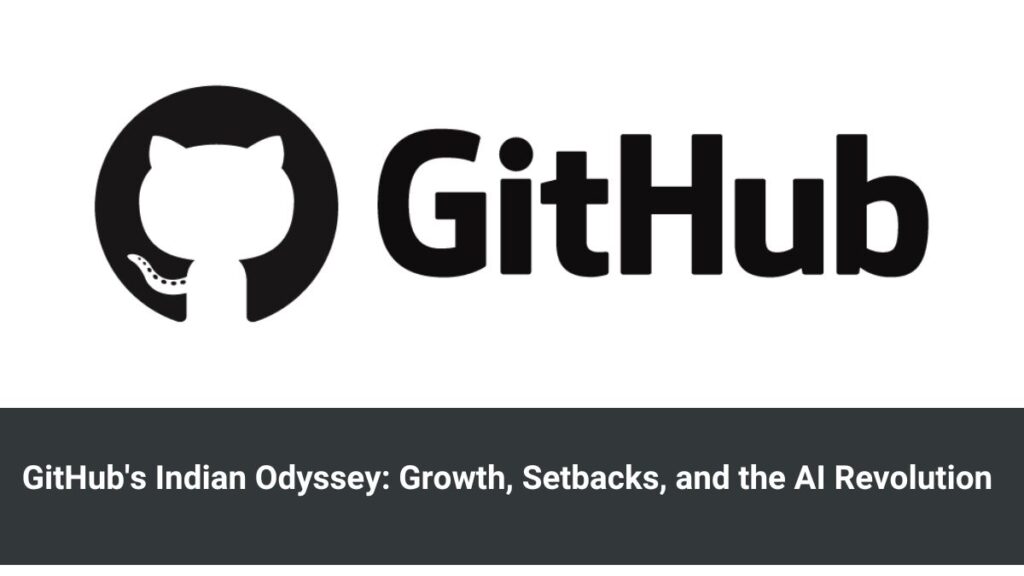In the pulsating heart of India’s tech scene, a story of resilience and potential unfolds. GitHub, the world’s leading software development platform, has seen its Indian developer base swell to an impressive 15.4 million, with 2.2 million new members joining the ranks. Yet, this tale of growth is not without its thorns. In a candid conversation with the Economic Times, GitHub CEO Thomas Dohmke addressed the elephant in the room: the company’s decision to lay off 80% of its Indian workforce in 2023. It’s a narrative that intertwines corporate strategy, human impact, and the boundless promise of artificial intelligence in shaping India’s digital future.
The Great Reorganization: Unraveling GitHub’s Tough Call
Picture this: a bustling GitHub office in India, humming with the energy of brilliant minds collaborating on code that powers the world. Now, imagine the silence that follows when eight out of ten employees learn their positions are being eliminated. It’s a scenario that played out last year, sending shockwaves through the tech community.
“We didn’t make that decision lightly,” Dohmke emphasizes, his voice carrying a weight that speaks volumes about the gravity of the choice. The layoffs, he explains, were not a reflection on India but rather on specific product areas affected by economic headwinds. It’s a distinction that offers little comfort to those who found themselves suddenly adrift in the job market.
A Silver Lining in the Microsoft Cloud
Yet, amidst the turmoil, a sliver of hope emerged. Many of the affected employees had originally come from Microsoft, GitHub’s parent company. In a display of corporate responsibility—or perhaps strategic foresight—Microsoft extended a lifeline, rehiring a significant portion of the laid-off workers.
“Fortunately, the majority of these employees… possessed skills that allowed Microsoft to rehire them, despite the process not being ideal,” Dohmke notes. It’s a bittersweet twist, a reminder that even in the tech world’s constant churn, human capital remains invaluable.
The AI Paradox: Threat or Catalyst for Indian IT?
As the dust settles on GitHub’s restructuring, a larger question looms on the horizon: Will the rise of artificial intelligence spell doom for India’s IT giants, long reliant on outsourcing and manual tasks? It’s a fear that keeps many awake at night, visions of algorithms displacing armies of coders dancing in their heads.
Dohmke, however, paints a different picture—one where AI acts not as a disruptor but as an elevator, lifting Indian IT to unprecedented heights. “We’re dealing with an ever-growing amount of software in the system,” he points out. “No company I’ve encountered deletes more code than they write each day; the complexity keeps increasing.”
The Complexity Conundrum
In my years covering the tech industry, I’ve witnessed firsthand the Sisyphean task of maintaining legacy systems while simultaneously pushing the boundaries of innovation. It’s a juggling act that grows more intricate by the day. Dohmke’s words resonate deeply: “We’re constantly maintaining and updating software, adapting to the latest technology. With AI systems, we’re entering a new level of complexity, requiring even more software developers, especially in India.”
It’s a compelling argument. Far from rendering developers obsolete, AI may well amplify the demand for human ingenuity to harness and direct these powerful tools. And India, with its vast pool of talent, stands poised to lead the charge.
India’s Ascent: From Outsourcing Hub to AI Powerhouse
The numbers tell a story of unstoppable momentum. GitHub projects that by 2027, India’s developer community will surpass that of the United States, which currently boasts 21 million members. It’s not just about quantity, but quality and diversity.
“About 200,000 computer science graduates are coming out of engineering degrees, and that creates a convergence,” Dohmke observes. “India could be the leader, not only in software but also in AI.”
The Native Language Revolution
What truly excites me about this trajectory is the democratization of coding. Dohmke envisions a future where “children and adults alike will learn to code in their native language, leading to a prolonged groundswell of developers.” It’s a powerful image—millions of minds across India’s linguistic tapestry, each contributing their unique perspective to the global tech conversation.
I’m reminded of a young developer I met in Bengaluru last year, who dreamed of creating educational apps in Kannada. “Why should English be the gatekeeper to technology?” she asked me. With tools like GitHub becoming more accessible and AI lowering barriers to entry, her vision seems less a dream and more an impending reality.
Navigating the Currents of Change
As we stand at this inflection point in India’s tech journey, the path forward is neither straight nor certain. GitHub’s layoffs serve as a stark reminder that even giants can stumble, that growth often comes hand-in-hand with painful adjustments. Yet, in Dohmke’s measured optimism and the platform’s unwavering commitment to India, we glimpse a future brimming with possibility.
The question before us is not whether change will come—it is already here, in the form of AI, in the shifting tides of global economics, in the very code that weaves through our digital lives. The real question is: How will we harness these forces? Will we allow ourselves to be buffeted by the winds of disruption, or will we set our sails to catch the gusts of innovation?
To the laid-off GitHub employees who found new homes at Microsoft, to the startups pivoting to embrace AI, to the students coding in Tamil, Hindi, or Bengali—you are the navigators of this new world. Your resilience, your creativity, your unique perspectives are the true currency of the coming era.
So let us not shrink from the challenges ahead, nor be daunted by the complexity of the systems we build. Instead, let’s view each line of code as a brick in the foundation of India’s tech legacy. A legacy that, if we nurture it right, could see this nation not just participating in the global dialogue on AI and software development, but leading it.
The GitHub story in India is far from over. It is, in many ways, just beginning. And I, for one, can’t wait to see what the next commit brings.

